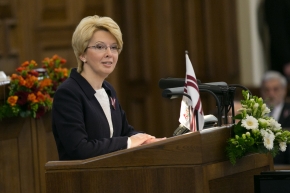 VideosGallery
VideosGallery
“The state can exist as along as its people want it to exist or, in other words, as long as the people have a strong desire for their own state. It is a nation’s political choice – to exist as a titular nation with its own language, culture and collective memory, and to desire its own nation state. With this strong desire we as a society that is united by belonging to Latvia have become stronger, more cohesive, more similar in our understanding of the events of our past, and we feel the ground more solid under our feet,” said Ināra Mūrniece, Speaker of the Saeima, on Tuesday, 18 November, when addressing the participants of the ceremonial sitting held at the Saeima in honour of the 96th anniversary of the proclamation of the Republic of Latvia.
The Speaker of the Saeima reminded the audience that this year, the essence of the state of Latvia has been discussed more than during the entire previous decade. “In 2014, both internal and external processes caused significant changes in Latvia’s society – changes in our self-esteem, as well as changes in our attitude towards our past and the state. Therefore, we can regard this year as a turning point.”
In her address, Ināra Mūrniece touched upon crisis in Ukraine and its reverberations in Latvia. “Although the armed and ideological conflict which has flamed up nearby is also a threat to us, we are looking to the future with greater trust and self-confidence. We are ready to withstand hardships, if such should arise, because we know that by keeping our stars brightly shining we will survive,” confidently said the Speaker.
Speaker Mūrniece indicated that the fighting in Ukraine is not only about territorial integrity or economic influence; it is a fight for the chosen path of development and a fight marking the eastern border of modern European culture space. “Ukrainians are defending our independence as well; therefore, Latvia is obliged to support them.”
By emphasising that knowledge and culture develop patriotism and love towards one’s state, the Speaker of the Saeima quoted poet Kārlis Skalbe who once indicated to the members of the Constitutional Assembly that the essence of the state of Latvia is our national culture which manifests itself as the state: “Without national culture there is no nation and no state. Therefore, this element is particularly significant.”
Ināra Mūrniece was also confident that poet Skalbe would have said the same thing today. “By investing in culture, we are investing in our nation’s existence, stability and defence. That should be reflected in budgetary allocations for culture.”
When emphasising the role of the Latvian language, Speaker Mūrniece urged everyone to give our official language the place it rightly deserves in our daily life, not only on festive occasions. “I doubt that you will disagree that nearly a quarter of a century after the restoration of Latvia’s independence public officials and civil servants in their addresses and interviews with local mass media should speak in one language – the Latvian language. It is a matter of self-respect,” said the Speaker of the Saeima.
With regard to the role of our state in international affairs Ināra Mūrniece admitted that the modern world has changed fundamentally, and survival is possible only through cooperation. “This idea is symbolically expressed in the unifying force of the Baltic Way, whose significance we are emphasising this year. Latvia is a trustworthy member of the North Atlantic Treaty Organisation. Soldiers of our National Armed Forces are admirably representing us in international missions and thereby increasing Latvia’s security,” said the Speaker noting that our homeland defence gene is not lost and that the increasing number of recruits in our National Guard attests to that. Speaker Mūrniece also added that the NATO Summit in Wales confirmed the rightness of our geopolitical choice made 10 years ago.
In her address, the Speaker of the Saeima indicated that in Latvia, Kremlin’s soft power has shifted to open, extensive information warfare and that in the war of words over people’s minds and hearts, we have to resist the emotional pressure exerted by the attacker. “How? First of all, by critically assessing information available in the public space; and second, by improving the defence and development of information space in Latvia. A skilfully coordinated and effective action by the state cannot be postponed any longer,” said Ināra Mūrniece and added that one’s personal basic principles and worldviews must prevail at all times. „Only free and educated people form a confident nation.”
The Speaker of the Saeima also referred to the tasks that have to be accomplished before Latvia’s centenary and indicated that we have already started planning the cultural agenda of the centenary celebrations by opening doors to new ideas, opportunities and achievements: “We will be able to bead these pearls of cultural excellence in one wreath to be worn with pride and confidence.” The Speaker emphasised that we have to find solutions for reducing the income gap as well so that „the wearer of this splendid wreath at least has decent footwear”.
Ināra Mūrniece noted that during the upcoming years we have to assess and overcome the consequences of the totalitarian communist regime in a deliberate and structured manner. “The independent democratic state of Latvia has to be clearly distinguished from the Latvia that was governed by the Soviet occupation regime and its mind-set. We have to free our minds, thoughts and worldviews from the residues of occupation,” emphasised the Speaker.
In the conclusion, Speaker Mūrniece highlighted: “Just like other European states we can say that Latvia is doing alright. But it is not enough. Latvia will really be alright when all of its people feel alright. Latvia is all of us together with our longings, hopes and strength.”
Full text of the address is available at: http://ej.uz/psny
Saeima Press Service







